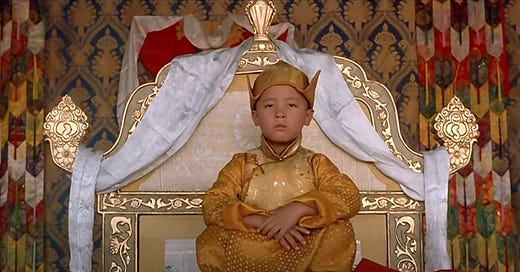Today I’m going to talk a little more about the Chinese Communist Party (CCP) and it’s malign influence on Hollywood.
But before I dive into that, I want to tell you that Tyrone and I will be doing a livestream episode of Haman Nature on X and YouTube next Saturday, May 17th, around 10am Pacific (I’ll be more precise in the days leading up to it). We are planning on doing a lot of fun stuff including playing our favorite libertarian-ish Monty Python moments. I hope you can make it!
And now, please enjoy a shocking tale of Hollywood stabbing one of its brightest artists in the back to placate the CCP.
Ever watch Martin Scorsese’s 1997 film Kundun? Few have. It’s a biographical drama about the early life of the 14th Dalai Lama and China’s invasion of Tibet. The film faced significant interference from the CCP due to its critical portrayal of China’s actions during the event.
Kundun, produced by Disney’s Touchstone Pictures, depicted the CCP’s 1950 invasion of Tibet and atrocities like the bombing of monasteries and forced cultural suppression. These portrayals clashed with the CCP’s tightly controlled narrative, as Tibet is one of the “Three Ts” (Tibet, Taiwan, Tiananmen) deemed highly sensitive.
In 1996, two days after filming began in Morocco, a Chinese Embassy representative contacted Disney’s chief strategic officer, Lawrence Murphy, expressing Beijing’s objections to the film’s subject matter. The CCP threatened Disney’s broader business interests in China, including access to its growing market and plans for ventures like Shanghai Disneyland.
Disney CEO Michael Eisner faced a dilemma: halting the film would anger Scorsese and signal weakness, while proceeding risked China’s retaliation. Eisner chose a compromise, allowing production but severely limiting distribution and marketing.
Disney released Kundun on Christmas Day 1997 in only two U.S. theaters, effectively burying it to minimize visibility and appease the CCP. This starkly contrasted with the film’s $28 million budget and its four Academy Award nominations.
Scorsese himself noted Disney’s lack of support, stating in a 1998 interview that the studio “didn’t push the picture,” likely due to fear of offending China’s “enormous” market. He acknowledged the market’s importance for corporations like Disney.
Naturally, this tanked the film. It grossed less than $6 million domestically, a commercial failure, partly due to Disney’s deliberate suppression to protect its relationship with China.
The CCP banned Kundun in China, alongside other 1997 films critical of China (Seven Years in Tibet and Red Corner). Disney faced a temporary ban on its films and TV cartoons in China, and Scorsese, screenwriter Melissa Mathison, and others involved were barred from entering China for years.
Disney’s response to this was revolting. In 1998, Eisner publicly apologized to Chinese Premier Zhu Rongji, calling Kundun a “stupid mistake” and noting, “The bad news is that the film was made; the good news is that nobody watched it.” This groveling secured Disney’s reentry into China, culminating in the 2016 opening of Shanghai Disneyland.
The CCP’s pressure (and Disney’s cowardice) set a precedent for Hollywood, signaling that critical portrayals of China could jeopardize market access. Disney’s capitulation influenced other studios to self-censor to avoid similar consequences.
The Kundun incident was part of the CCP’s emerging strategy in the 1990s to control its global image by leveraging China’s growing box office (now the world’s largest). By 1997, China allowed only 34 foreign films annually, giving the CCP significant gatekeeping power. Studios like Disney, eager for market access, complied with censorship demands.
The CCP also banned Scorsese’s The Departed (2006) in China due to a subplot involving Chinese criminals and a reference to potential nuclear action against Taiwan. The film was later released on DVD with edits removing these elements, showing the CCP’s ongoing sensitivity to Scorsese’s work.
The throttling of Kundun marked a pivotal moment in Hollywood’s relationship with the CCP. Disney’s decision to prioritize market access over artistic freedom demonstrated the CCP’s ability to enforce compliance through economic leverage.
This case, alongside bans on Seven Years in Tibet and Red Corner, discouraged Hollywood from producing films critical of China, as noted by Richard Gere in 2020 Senate testimony. The incident underscored the CCP’s use of soft power to shape global narratives, as highlighted in the documentary Hollywood Takeover.
If you didn’t click the link I shared yesterday to that video, here’s another chance!
I don’t think it’s good for any American business to kowtow to the CCP the way many do, especially our artistic Hollywood movie companies. I really hope their integrity and long-term vision grows in relationship to their greed, such that they tell China to bugger off.
Show some stones, Hollywood.
Naturally,
Adam
PS: Hope to see you Saturday on our livestream! More details to follow.




This is disturbing. The world is so much different than we are allowed to know.